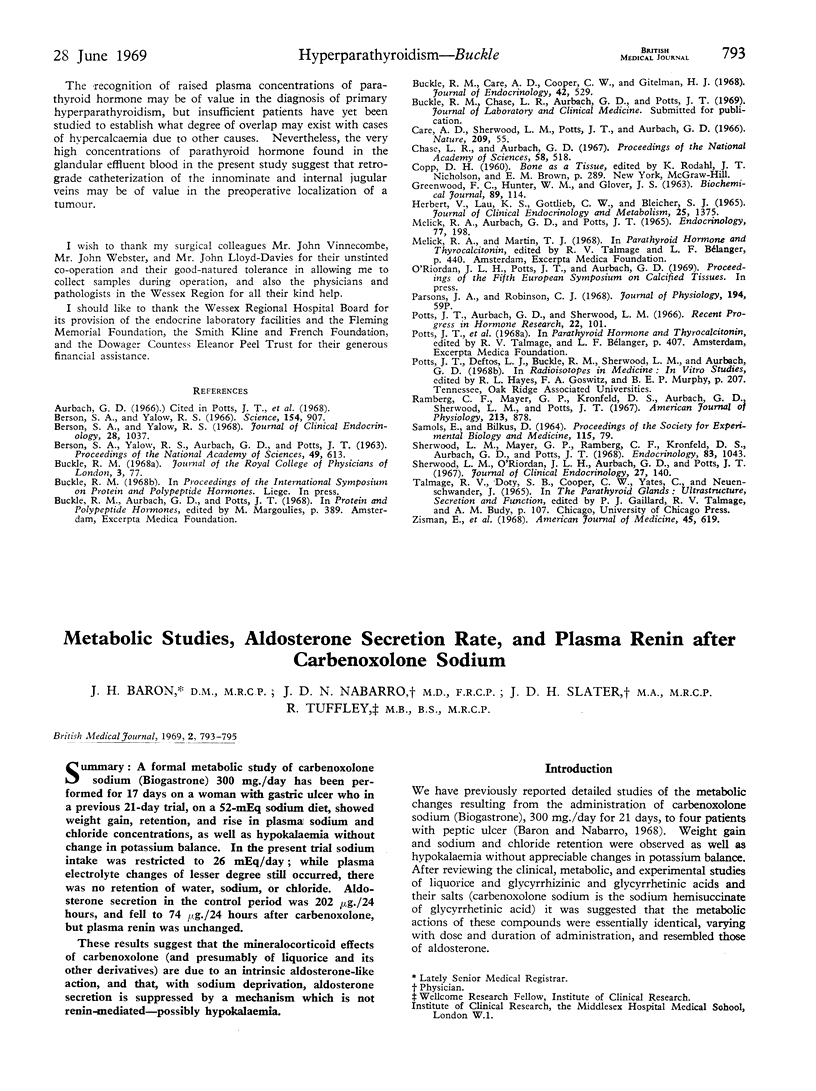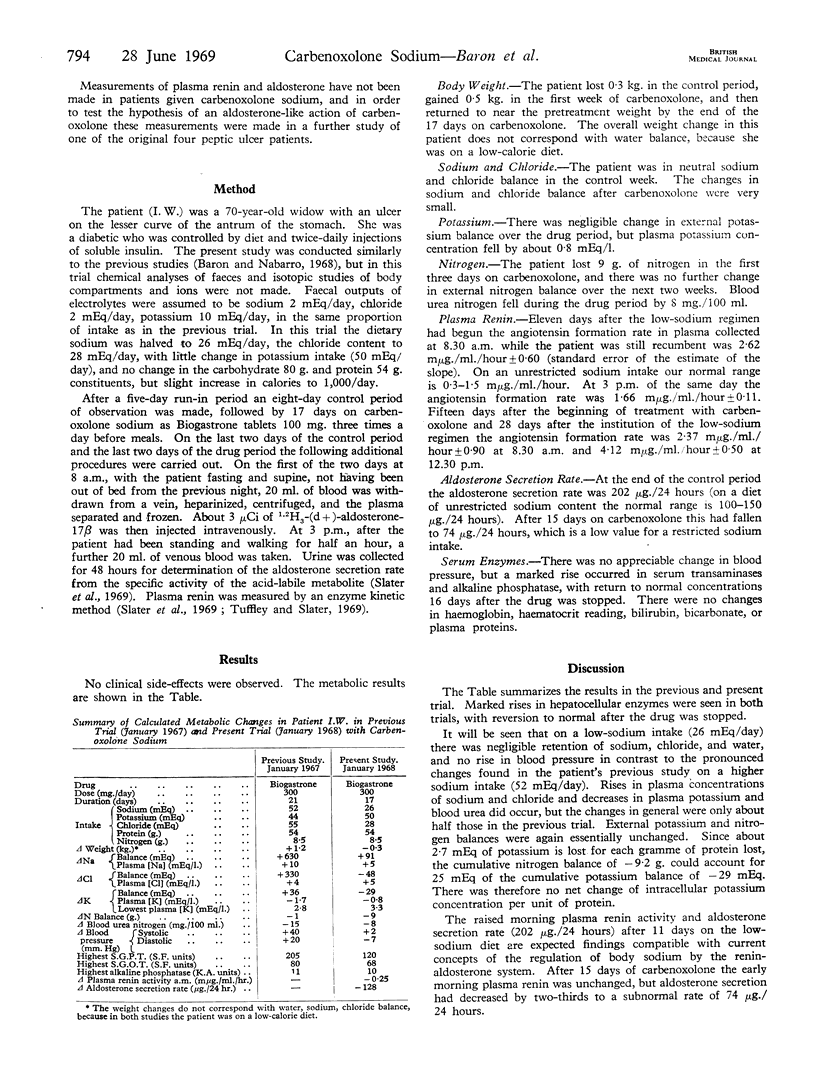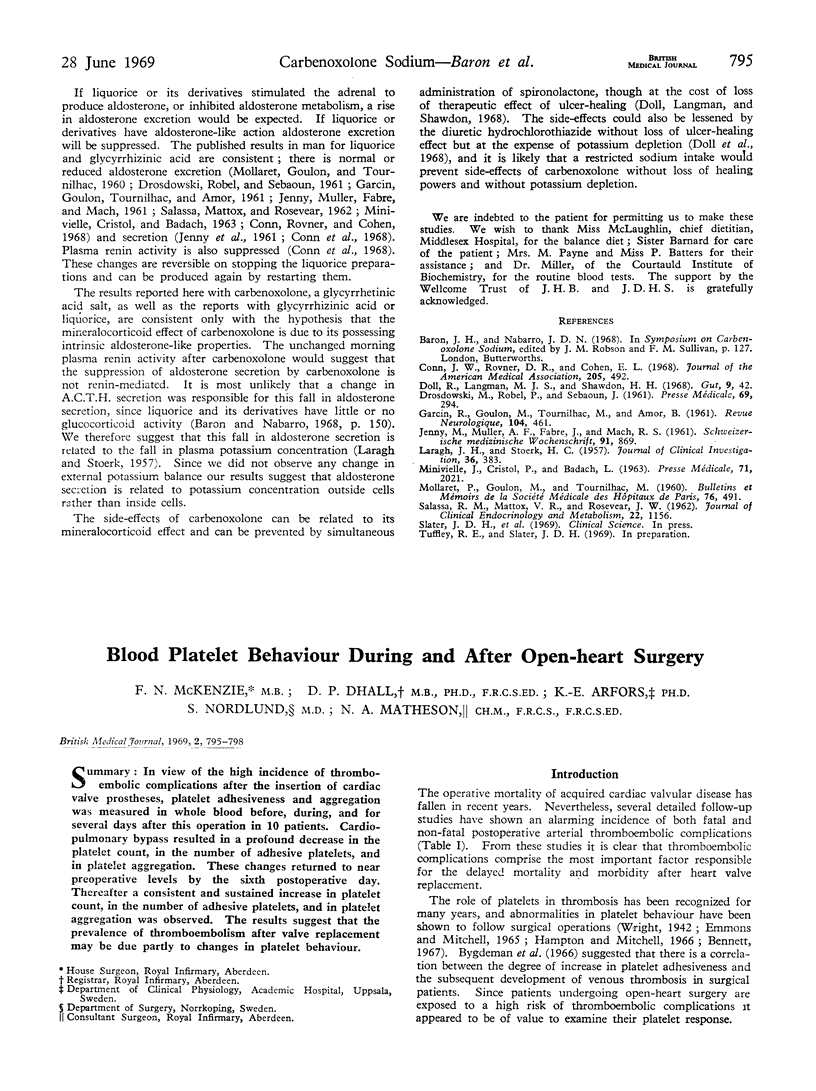Abstract
A formal metabolic study of carbenoxolone sodium (Biogastrone) 300 mg./day has been performed for 17 days on a woman with gastric ulcer who in a previous 21-day trial, on a 52-mEq sodium diet, showed weight gain, retention, and rise in plasma sodium and chloride concentrations, as well as hypokalaemia without change in potassium balance. In the present trial sodium intake was restricted to 26 mEq/day; while plasma electrolyte changes of lesser degree still occurred, there was no retention of water, sodium, or chloride. Aldosterone secretion in the control period was 202 μg./24 hours, and fell to 74 μg./24 hours after carbenoxolone, but plasma renin was unchanged.
These results suggest that the mineralocorticoid effects of carbenoxolone (and presumably of liquorice and its other derivatives) are due to an intrinsic aldosterone-like action, and that, with sodium deprivation, aldosterone secretion is suppressed by a mechanism which is not renin-mediated—possibly hypokalaemia.
Full text
PDF


Selected References
These references are in PubMed. This may not be the complete list of references from this article.
- Conn J. W., Rovner D. R., Cohen E. L. Licorice-induced pseudoaldosteronism. Hypertension, hypokalemia, aldosteronopenia, and suppressed plasma renin activity. JAMA. 1968 Aug 12;205(7):492–496. doi: 10.1001/jama.205.7.492. [DOI] [PubMed] [Google Scholar]
- DROSDOWSKI M., ROBEL P., SEBAOUN J. [Syndrome of potassium depletion simulating Conn's disease, induced by glycyrrhizin]. Presse Med. 1961 Feb 11;69:294–295. [PubMed] [Google Scholar]
- Doll R., Langman M. J., Shawdon H. H. Treatment of gastric ulcer with carbenoxolone: antagonistic effect of spironolactone. Gut. 1968 Feb;9(1):42–45. doi: 10.1136/gut.9.1.42. [DOI] [PMC free article] [PubMed] [Google Scholar]
- GARCIN R., GOULON M., TOURNILHAC M., AMOR B. [New case of paralysis with hypokalemia and metabolic alkalosis secondary to excessive and prolonged ingestion of licorice extract after treatment of alcoholic intoxication]. Rev Neurol (Paris) 1961 Jun;104:461–468. [PubMed] [Google Scholar]
- JENNY M., MULLER A. F., FABRE J., MACH R. S. [Hypokalemia and alkalosis caused by excessive ingestion of extract of licorice and bicarbonated water. Pseudo-syndrome of Conn]. Schweiz Med Wochenschr. 1961 Jul 29;91:869–875. [PubMed] [Google Scholar]
- LARAGH J. H., STOERK H. C. A study of the mechanism of secretion of the sodium-retaining hormone (aldosterone). J Clin Invest. 1957 Mar;36(3):383–392. doi: 10.1172/JCI103434. [DOI] [PMC free article] [PubMed] [Google Scholar]
- MINVIELLE J., CRISTOL P., BADACH L. L'ABUS DE R'EGLISSE (GLYCYRRHIZINE). EXPRESSION CLINIQUE: PARALYSIES AVEC HYPOKALI'EME (2 OBSERVATIONS); HYPERTENSION ART'ERIELLE (25 OBSERVATIONS). DISCUSSION PHYSIOPATHOLOGIQUE. Presse Med. 1963 Oct 19;71:2021–2024. [PubMed] [Google Scholar]
- MOLLARET P., GOULON M., TOURNILHAC M. [Quadriplegia with hypokalemia and metabolic alkalosis secondary to massive and prolonged ingestion of licorice extract in an alcoholic and potomanic psychopath]. Bull Mem Soc Med Hop Paris. 1960 Apr 1;76:491–512. [PubMed] [Google Scholar]
- SALASSA R. M., MATTOX V. R., ROSEVEAR J. W. Inhibition of the "mineralocorticoid" activity of licorice by spironolactone. J Clin Endocrinol Metab. 1962 Nov;22:1156–1159. doi: 10.1210/jcem-22-11-1156. [DOI] [PubMed] [Google Scholar]


